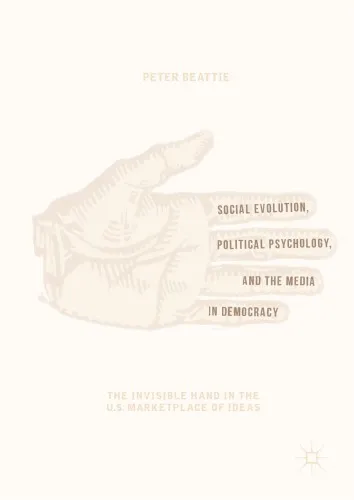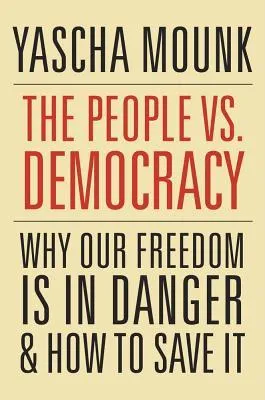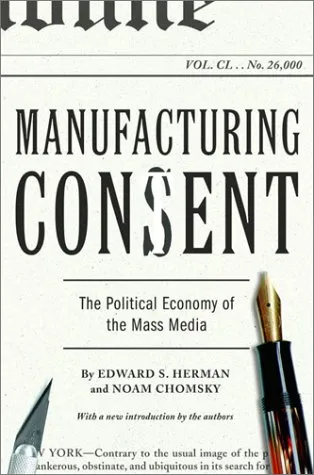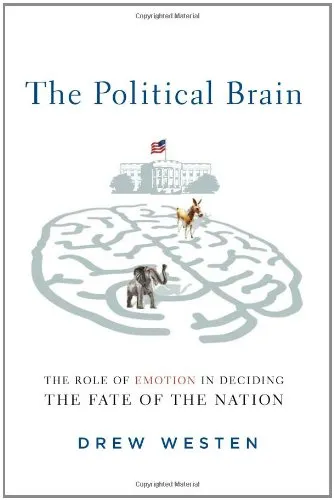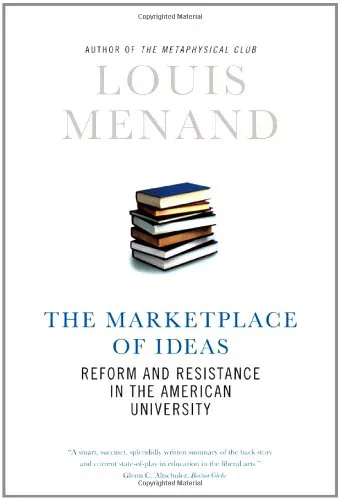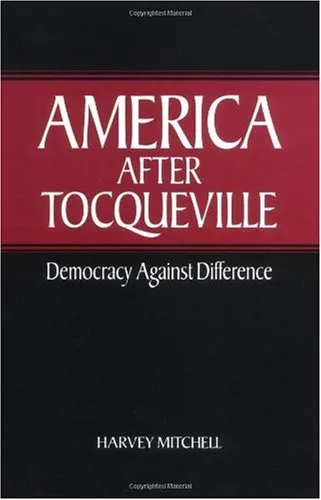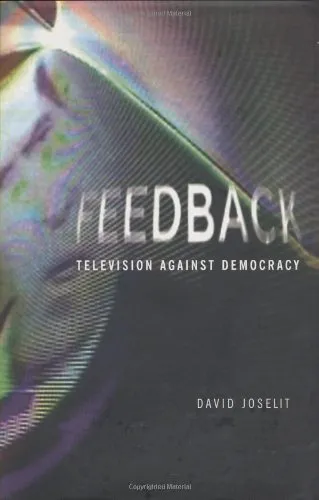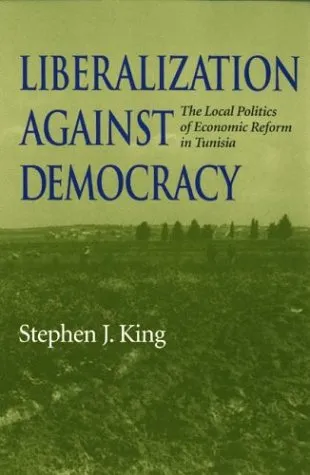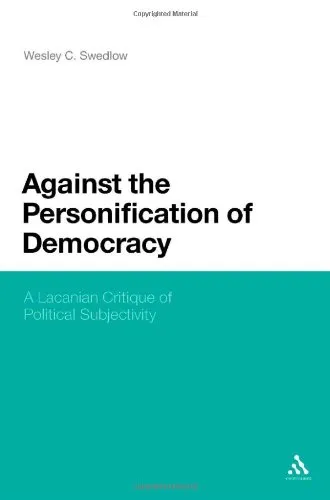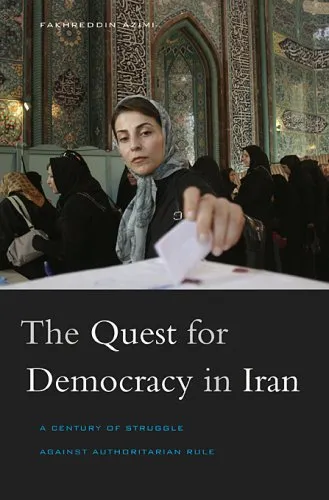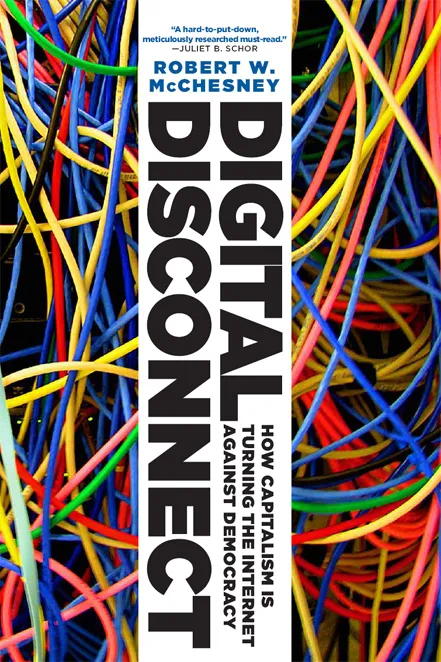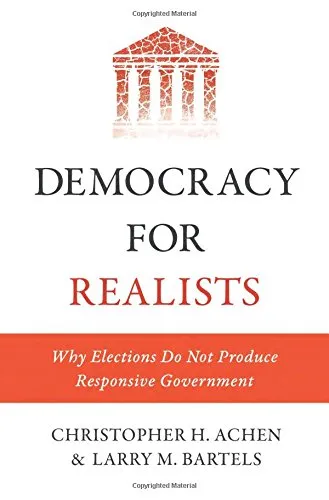Social Evolution, Political Psychology, and the Media in Democracy: The Invisible Hand in the U.S. Marketplace of Ideas
4.0
بر اساس نظر کاربران

شما میتونید سوالاتتون در باره کتاب رو از هوش مصنوعیش بعد از ورود بپرسید
هر دانلود یا پرسش از هوش مصنوعی 2 امتیاز لازم دارد، برای بدست آوردن امتیاز رایگان، به صفحه ی راهنمای امتیازات سر بزنید و یک سری کار ارزشمند انجام بدینکتاب های مرتبط:
معرفی کتاب: Social Evolution, Political Psychology, and the Media in Democracy
کتاب «Social Evolution, Political Psychology, and the Media in Democracy: The Invisible Hand in the U.S. Marketplace of Ideas» اثری هوشمندانه و جامع است که توسط پیتر بیتی (Beattie, Peter) نوشته شده و به بررسی تعامل میان تکامل اجتماعی، روانشناسی سیاسی و تأثیر رسانهها در دموکراسی ایالات متحده میپردازد. این کتاب به طور خاص بر روی پدیدههای پیچیدهای همچون نقش رسانهها در شکلدهی به انگارههای عمومی و نقد دموکراسی لیبرال تمرکز دارد.
خلاصهای تفصیلی از کتاب
در این کتاب، نویسنده با تلفیق بینشهای نظری از حوزههای مختلف مانند political psychology، علوم اجتماعی و مطالعات رسانه، پویاییهای Marketplace of Ideas در ایالات متحده را تحلیل میکند. پیتر بیتی استدلال میکند که «دست نامرئی» که معمولاً به بازارهای اقتصادی نسبت داده میشود، در عرصه اطلاعات و ایدهها نیز نقش دارد. با این حال، همانگونه که توزیع ثروت در بازارها نابرابر است، در Marketplace of Ideas نیز ایدهها و اطلاعات به شکلی نابرابر منتشر و پذیرفته میشوند. کتاب جنبههای مختلف قدرت رسانهای را بررسی میکند، اینکه چگونه نهادهای قدرتمند از تکنیکهای پیشرفته persuasion برای قالببندی روایتهای سیاسی و اجتماعی استفاده میکنند. این موارد شامل تحلیلهای مفهومی عمیقی از phenomena مانند framing effects، cognitive biases، و selective exposure است. نویسنده علاوه بر این، نظریههای تکامل اجتماعی را به کار میگیرد تا توضیح دهد چگونه دینامیکهای فرهنگی و تاریخی، سیستمهای رسانهای و ساختارهای سیاسی را شکل دادهاند.
بیتی همچنین به کاستیهای نظریههای مرسوم در دموکراسی لیبرال میپردازد و انتقادی از این دیدگاه ارائه میکند که شهروندان به عنوان عاملهای عقلانی و مستقل در سیستمهای مبتنی بر اطلاعات آزاد عمل میکنند. از طریق بررسیهای تطبیقی و شواهد تجربی، او نشان میدهد که چگونه اطلاعات بیشتر لزوماً به تصمیمگیریهای بهتر منجر نمیشود و اغلب میتواند به polarization یا تحکیم تعصبات منجر شود.
مباحث کلیدی و نکات ارزشمند کتاب
- تحلیل پدیده Marketplace of Ideas و ماهیت نابرابر انتشار ایدهها در جامعه مدرن.
- نقش روانشناسی شناختی در فهم تاثیر رسانهها بر نگرشها و باورهای عمومی.
- نقد دیدگاههای کلاسیک دموکراسی لیبرال و نیاز به بازبینی آنها.
- کاربرد نظریههای تکامل اجتماعی در تحلیل سیستمهای رسانهای و سیاسی.
- بررسی راهکارهایی برای بهبود کیفیت گفتوگوهای عمومی و تقویت دموکراسی.
برخی از نقلقولهای مشهور از کتاب
"The invisible hand may guide markets, but in the Marketplace of Ideas, it often misleads and divides."
"Free access to information is necessary for democracy, but it is not sufficient to ensure informed decision-making."
"Human cognition is not a perfect tool for analyzing reality; it's a survival mechanism shaped by millennia of evolution."
چرا این کتاب اهمیت دارد؟
کتاب «Social Evolution, Political Psychology, and the Media in Democracy» از آن دست آثاری است که نگاه ما به دموکراسی و عملیات رسانهها را تغییر میدهد. در دنیایی که وابستگی ما به اطلاعات و رسانههای دیجیتال روز به روز بیشتر میشود، درک نحوه تأثیر آنها بر تصمیمگیریها و باورهای ما یک امر حیاتی است. این کتاب به ما نشان میدهد که چرا معرفی اطلاعات بیشتر و متنوعتر به تنهایی برای ایجاد جامعهای آگاهتر کافی نیست، و ضرورت توجه به نحوه پردازش اطلاعات توسط مغز انسان و ساختارهای قدرت اجتماعی را تأکید میکند.
این کتاب برای محققان علوم اجتماعی، متخصصان رسانه، سیاستمداران و هر کسی که به آینده دموکراسی و سیستمهای ارتباطی علاقهمند است، یک اثر ضروری و آموزنده است. نویسنده با دقت و عمق نظری که به کار میگیرد، موضوعاتی را بررسی میکند که برای درک بهتر دنیای امروز بسیار مهم هستند.
Introduction
**Social Evolution, Political Psychology, and the Media in Democracy: The Invisible Hand in the U.S. Marketplace of Ideas** explores the intersection of social evolution, human psychology, media dynamics, and democratic governance. This book provides readers with an in-depth examination of how ideas propagate within a democratic society, how media systems influence the public's thoughts and behavior, and how these dynamics are shaped by our evolutionary past. Using a multidisciplinary approach, it unveils the often unseen forces that shape public opinion, policy preferences, and collective decision-making in the United States.
Democracy thrives on the free exchange of ideas, but this marketplace of ideas does not operate as freely or rationally as often idealized. Media ecosystems, driven by profit motives, political agendas, and cognitive biases, play a pivotal role in shaping the contours of democratic discourse. The book dissects the "invisible hand" that directs this marketplace, revealing how misinformation, partisanship, and psychological tendencies can distort democratic deliberation and decision-making. By connecting principles of evolutionary psychology with modern communication research, it illuminates the deeper mechanisms behind political polarization, misinformation, and other critical challenges facing democracy today.
Summary of the Book
This book is divided into several thought-provoking chapters that span the disciplines of sociology, evolutionary theory, political psychology, and media studies. Its key goal is to unravel the hidden dynamics that influence how individuals and societies process information, form opinions, and enact policies.
Starting with an exploration of evolutionary principles, the book delves into how human cognition has been shaped over thousands of years to prioritize specific patterns of thinking. Topics include tribalism, confirmation bias, and emotional reasoning—psychological tendencies that can undermine rational thinking in a modern democratic context. Through engaging examples and academic insights, the book connects these evolutionary traits to contemporary political behavior, explaining why humans are predisposed to groupthink, fear of outsiders, or susceptibility to echo chambers.
From there, the focus shifts to the role of media in the "marketplace of ideas." By analyzing the U.S. media landscape, the book discusses how a competitive, profit-driven media system reinforces polarization and amplifies sensationalism. The intricacies of agenda-setting, framing, and media bias are dissected, revealing how these factors can distort our understanding of reality and undermine meaningful discourse.
Finally, the book addresses solutions, offering strategies to counteract the negative effects of media manipulation, societal polarization, and misinformation. Drawing on research from cognitive science, education, and grassroots activism, it emphasizes the urgent need for systemic reforms and public awareness initiatives to safeguard the future of democracy.
Key Takeaways
- Human cognition is deeply influenced by evolutionary traits, which can lead to biases that threaten democratic ideals.
- The "invisible hand" of the media marketplace is driven more by profit and systemic incentives than by truth or fairness.
- Cognitive biases like confirmation bias and tribalism can make individuals vulnerable to misinformation and propaganda.
- Media framing and agenda-setting have a direct impact on public opinion and policy priorities.
- Systemic reforms and public education are vital to improving the resilience of democratic systems against manipulation.
Famous Quotes from the Book
This book features several notable insights that capture the essence of its arguments:
"The marketplace of ideas functions less like a rational exchange and more like a Darwinian jungle, where the survival of the loudest often outweighs the survival of the truest."
"Democracy's greatest paradox is that a system built on collective reasoning can so easily be undone by individual emotionalism."
Why This Book Matters
In an era defined by misinformation, partisan divides, and declining trust in democratic institutions, this book is a timely intervention. It equips readers with the tools to recognize and combat the psychological and systemic forces undermining democratic discourse. By blending academic rigor with accessible language, it appeals to scholars, policymakers, journalists, and concerned citizens alike.
The U.S. and other democracies across the globe face mounting challenges, ranging from the pervasive influence of social media algorithms to the erosion of public trust in traditional institutions. This book underscores the urgency of reimagining our information ecosystem and fostering media literacy to ensure a healthier marketplace of ideas. Ultimately, it serves as both a call to action and a guide for understanding the underlying dynamics that drive our political and media environments.
دانلود رایگان مستقیم
شما میتونید سوالاتتون در باره کتاب رو از هوش مصنوعیش بعد از ورود بپرسید
دسترسی به کتابها از طریق پلتفرمهای قانونی و کتابخانههای عمومی نه تنها از حقوق نویسندگان و ناشران حمایت میکند، بلکه به پایداری فرهنگ کتابخوانی نیز کمک میرساند. پیش از دانلود، لحظهای به بررسی این گزینهها فکر کنید.
این کتاب رو در پلتفرم های دیگه ببینید
WorldCat به شما کمک میکنه تا کتاب ها رو در کتابخانه های سراسر دنیا پیدا کنید
امتیازها، نظرات تخصصی و صحبت ها درباره کتاب را در Goodreads ببینید
کتابهای کمیاب یا دست دوم را در AbeBooks پیدا کنید و بخرید
